WHEELS of INDUSTRY
Page 38
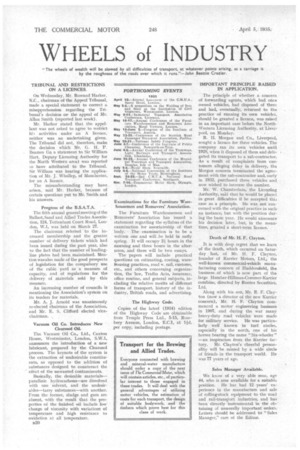
Page 39
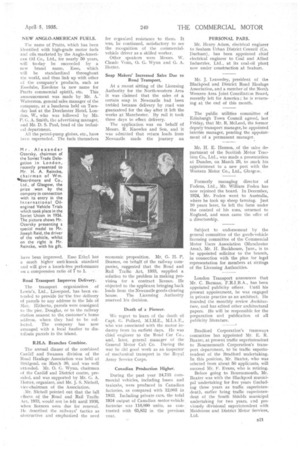
Page 40
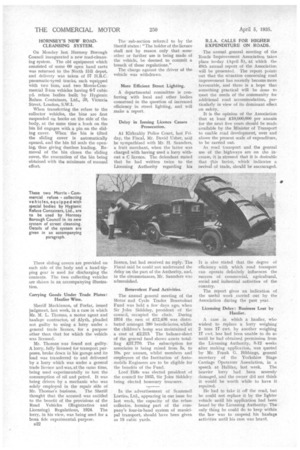
Page 41
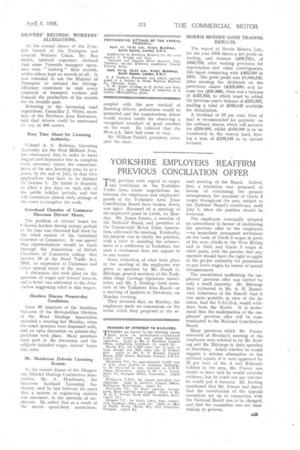
Page 42
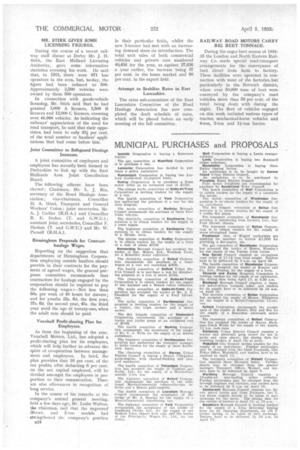
Page 43
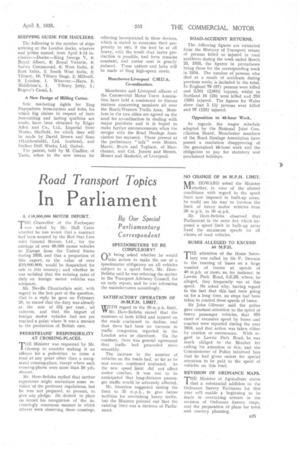
If you've noticed an error in this article please click here to report it so we can fix it.
" The wheels of wealth will be slowed by all difficulties of transport, at whatever points arising, as a carriage is by the roughness of the roads over which it runs."—John Beattie Crozier.
TRIBUNAL AND RESTRICTIONS ON A LICENCES.
On Wednesday, Mr. Rowand Harker, KC., chairman of the Appeal Tribunal, made a special statement to correct a misapprehension regarding the Tribunal's decision on the appeal of Mr. Allan Smith (reported last week).
Mr. Harker stated thai the appellant was not asked to agree to restrict hie activities under an A licence, neither was an undertaking given. The Tribunal did not, therefore, make the decision which Mr. G. H. P. Beames (in a statement to Sir William Hart, Deputy Licensing Authority for the North Western area) was reported -co • have attributed to the Tribunal. Sir William was bearing the -application of Mr. J. Whalley, of Manchester, for an A licence.
The misunderstanding may have arisen, said Mr. Harker, because of certain questions put to Mr. Smith and his answers.
Progress of the B.S.A.T.A.
The filth annual general mee Ling, of the Ballast, Sand and Allied Trades Association, 124, Tottenham Court Road, London, W.1, was held on March 27.
The chairman referred to the increased membership and the greater number of delivery tickets which had been issued during the past year, also to the fact that the number of loadingline plates had been maintained. Mention was also made of the good prospects of .legislation for the compulsory use of the cubic yard as a measure of capacity, and of regulations for the delivery of materials sold by this measure.
An increasing number of councils is mentioning the Association's system on its tenders for materials.
Mr. A. J. Arnold was unanimously re-elected chairman -of the Association, and Mr. E. S. Clifford elected vicechairman.
Vacuum Oil Co. Introduces New Clearosol
The Vacuum Oil Co., Ltd., Caxton House, Westminster, London, SAV.1., announces the introduction of a new lubricant, prepared by the Clearosol process. The keynote of the system is the extraction of undesirable constituents, as opposed to the addition of substances designed to counteract the effect of the unwanted contaminents.
Basically, the desirable materials— paraffinic hydrocarbons—are dissolved with one solvent, and the undesirables—tarry substances—with another. From the former, sludge and gum are absent, with the result that the properties of the finished oil include low change of viscosity, with variations of temperature and high resistance to oxidation at all temperature.
es20 Examinations for the Furniture Warehousemen and Removers' Association.
The Furniture Warehousemen and Removers' Assriciaticin has issued a statement regarding the syllabus of the examination for assoeiateship of that body. The examination is to be a written one and will be held in early spring. It will occupy 21 hours in the morning and -three hours in the afternoon, and there will he two essays.
The papers will include practical questions on estimating, costing, ware!rousing practices, road v. rail, customs, etc., and others concerning organization, the law, Traffin Acts, insurance, office routine, and general subjects, including the relative merits of different forms of transport, history of the industry, British roads, and advertising.
• The Highway Code.
Copies of the latest (1934) edition of the Highway Code" are obtainable from Temple Press Ltd., 5-15, Rosebery Avenue, London, E.C.1, at lid. per copy, including postage. IMPORTANT PRINCIPLE RAISED IN APPLICATION.
The principle of whether a concern of forwarding agents, which had once owned vehicles, had disposed of them and had, -eventually, returned to the practice of running its own vehielee, should be granted a licence, was raised in an important case before the NorthWestern LicensingLicensing Authority, at Liverpool, on Monday.
R. H. Morgan and Co., Liverpool, sought a licence for three vehicles. The company ran its own vehicles until 1928, when it disposed of them and delegated its transport to a sub-contractor. As a result of complaints from customers alleging delay in delivery, the Morgan concern terminated the agreement with the sub-contractor and, early in 1932, purchased three vehicles and now wished to increase the number.
Mr. W. Chamberlain, the Licensing Authority, said that he would be placed in great difficulties if he accepted thii case as a principle. Fie was not concerned with the original practice in such an instance, but with the position during the basic year. He.would announce his decision later, but, in the meantime; granted a short-term licence.
Death of Mr. H. F. Clayton.
It is with deep regret that we learn of the death, which occurred on Saturday last, of Mr. H. F. Clayton, founder of Harrier Motors, Ltd ethe well-known commercial-vehicle manufacturing concern of Hudderseld,. the business of which is now Part of the large Humber-Hillman-Commer-Karrier combine, directed by Rootes Securities, Ltd.
Aleng with his son, Mr. R. F. Clayton (now a director of the new Karrier concern), Mr. H. F. Clayton coinmenced a motor engineering business in 1997, and during the war many heavy-duty road vehicles were made for military service. He was particularly well known in turf circles, especially in the north, one of his horses bearing the name " Six-wheeler" —an inspiration from the Kerrie( factory. Mr. Clayton's cheerful personality will be •missed by a wide circle of friends in the transport world. He was 77 years of age.
Sales Manager Available.
We know of a very able man, age 44. who is now available for a suitable position. He has had 12 years' experience in the manufacture and sale of !piling-stock equipment to the road and rail-transPort industries, and hae been directly instrumental in the obtaMing of unusually important orders. Letters should be addressed to "Sales Manager," care of the Editor. NEW ANGLO-AMERICAN FUELS.
The name of Pratts, which has been identified with high-grade motor fuels and oils marketed by the Anglo-American Oil Co., Ltd., for nearly 50 years, will to-day be succeeded by a new brand name, Esso, which will be standardized throughout the world, and thus link up with other of the company's products, such as Essolube, EsSolene (a new name for
Pratts commercial spirit), etc. This announcement was made by . Mr. A.' Waterston, general sales manager of the company, at a luncheon held on Tuesday last at the Dorchester Hotel, London, W., who was followed by Mr.. P. G. A. Smith, the advertising manager, and Mr. D. S. Paul, head of the technical department.
All the petrol-pump globes, etc., have been superSeded. The fuels themselves have been improved. Esso Ethyl has a much higher anti-knock standard and will give a knock-free performance on a compression ratio r3f 7 to 1.
Road Transport Improves Delivery.'
The transport organization . of Lewis's, Ltd., Liverpool, has been Ortended to provide for "the free delivery of parcels to any address in the Isle of Man. Hitherto, parcels were consigned to the pier, Douglas, or to the railway station nearest to the, customer's home address, where they had to be collected. The company has now arranged with a local haulier to distribute parcels in the island.
R.H.A. Branches Combine.
The annual dinner of the combined Cardiff and Swansea division of the Road Haulage Association was held at Bridgend, on March 30, and was well attended. Mr. 0. G. Wynn, chairman of the Cardiff and District centre, presided, and was supported by Mr. G. A. I Fotter, organizer, and Mr. J. S. Nichol!, vice-chairman of the Association.
Nicholl pointed out that the full effects. of the Road and Rail Traffic Act, 1933, would not be felt until 1936, when licences were due for renewal. lie described the railways' tactics as obstructive and emphasized the need for organized resistance to them. It was, he continued, satisfactory to see the recognition of the commercialvehicle driver as a skilled worker.
Other speakers were Messrs. W. Claude Venn, 0. G. Wynn and G. A. hotter.
Soap Makers' Increased Sales Due to Road Transport.
At a recent sitting of the Licensing Authority for the North-western Area it was claimed that the sales of a certain soap in Newcastle had been trebled because delivery by road was guaranteed for the day after it left the works at Manchester. By rail it took three days to effect delivery. '
The application was on behalf of Messrs. R. Knowles and Son, and it was admitted that return loads from Newcastle made the journey an
economic proposition. Mr. G. IL P. Beames, on behalf of the railway companies, suggested that the Road and Rail Traffic Act, 1033, supplied a solution to the problem in making provision for a contract licence. He objected to the applicant bringing back loads from the Newcastle goods-clearing house. The Licensing Authority reserved his decision.
Death of "a Pioneer.
We regret to learn of the death of Capt. G. Pollard, M.I.M.E., M.I.A.E., who was associated with the motor industry from its earliest days. He was chief engineer to the Road Car Co., and, later, general manager of the General Motor Cab Co. During the war he did good work as an inspector of mechanical transport in the Royal Army Service. Corps.
-Canadian Production Higher.
During the past year 24,733 commercial vehicles, including buses and taxicabs, were produced in Canadian factories, as compared with 12,003 in 1933. Including private cars, the total 1004 output of Canadian motor-vehicle factories was 116,890 units, as contrasted With 65,852 in the previous; year.
PERSONAL PARS.
Mr. Henry Adam, electrical engineer to Seaham Urban District Council (Co. Durham), has been appointed chief electrical engineer to Coal and Allied Industries, Ltd., at its coal-oil plant now under construction at Seaham.
Mr. J. Leavesley, president of the Blaekpool and District Road Haulage Association, and a member of the North Western Area Joint Conciliation Board, recently left for America ; he is returning at the end of this month.
The public utilities committee of Edinburgh Town Council agreed, last Friday, that Mr. R. McLeod, the former deputy transport manager, be appointed interim manager, pending the appointment of a permanent manager.
Mr. H. E. Henson, . of the sales department of the Scottish Motor Traction Co., Ltd,, was made a presentation at Dundee, on March 20, to mark his appointment to a new post with the Western Motor Co., Ltd., Gla.sgr.w.
Formerly managing director of Fodens, Ltd., Mr. William rodeo has now rejoined the board. In December, 1924, Mr. Foden went to Australia, where he took up sheep fanning. Just 10 years later, he left the farm under the control of his sons, returned to England, and soon came the offer of a directorship.
Subject to endorsement by the general committee of the goods-vehicle licensing committee of the Commercial Motor Users Association (Manchester Area), Mr. II. Backhouse, funr., is to be appointed solicitor to the branch, in connection with the plan for legal representation for members at sittings of the Licensing Authorities.
London Transport announces that Mr. C. Barman, F.R.I.B.A., has been appointed publicity officer. Until his present appointment, he was engaged in private practice as an architect. He founded the monthly review Architectare, and has edited other architectural papers. He will be responsible for the preparation and publication of all publicity literature.
Bradford Corporation's tramways committee has appointed Mr. E. R. Baxter, at present traffic superintendent to Bournemouth Corporation's transport department, to be traffic superintendent of the Bradford undertaking. In this position, Mr. Baxter, who was selected from about 50 applicants, will succeed Mr. F. Evans, who is retiring.
Before going to Bournemouth, Mr. Baxter was with the Blackpool municipal 'undertaking for five years (including three years as traffic superintendent), earlier being traffic superintendent of the South Shields municipal undertaking for two years, r.nd previously divisional superintendent with Maidstone and District Motor Services, Ltd.
HORNSEY'S NEW ROADCLEANSING SYSTEM.
On Monday last Hornsey Borough Council inaugurated a new road-cleansing system. The old equipment which consisted of -some 60 open hand carts was returned to the North Hill depot, and delivery was taken of 57 H.R.C. pneumatic-tyred trucks, each equipped with two bins, and two Moths-Commercial 2-ton vehicles having 6-7 cubic yd. refuse bodies built by Hygienic Refuse Containers, Ltd., 39, Victoria Street, London, S.W.1.
When transferring the refuse to the collector vehicles, the bins are first suspended on hooks on the side" of the body, at the same time a hook on the bin lid engages with a pin on the sliding cover. When the bin is tilted the sliding cover is automatically opened, and the bin lid seals the opening, thus giving dustless loading. Removal of the bin closes the sliding cover, the evacuation of the bin being obtained with the minimum of manual. effort.
Three sliding covers are provided on each side of the body and a hand-tipping gear is used for discharging the contents. The two collecting vehicles are shown in an accompanying illustration.
Carrying Goods Under Trade Plates: Haulier Wins.
Sheriff Mackinnon, of Forfar, issued judgment, last week, in a case in which Mr. M. L. Thomas, a motor agent and haulage contractor, of Alyth, pleaded not guilty to using a lorry under a general trade licence, for a purpose other than that for which the vehicle was licensed.
Mr. Thomas was found not guilty. A lorry, fully licensed for transport purposes, broke down in his garage and its load was transferred to and delivered by a lorry which was under a general trade licence and was, at the same time, being used experimentally to test the consumption of oil and petrol. It was being driven by a mechanic who was solely employed in the repair side of
Mr. Thomas's business. The Sheriff thought that the accused was entitled to the benefit of the provisions of the Road Vehicles (Registration and Licensing) Regulations, 1924. The lorry, in his view, was being used for a bona fide experimental purpose.
1322 he sub-section referred to by the Sheriff states: "The holder of the licence shall not by reason only that some other or further use is being made of the vehicle, be deemed to commit a breach of these regulations."
The charge against the driver of the vehicle was withdrawn.
More Efficient Street Lighting.
A departmental committee is conferring with local and other bodies concerned in the question of increased efficiency in street lighting, and will make a report.
Delay inIssuing Licence Causes Prosecution.
At Kirkcaldy Police Court, last Friday, the Fiscal, Mr. David Usher, said he sympathized with Mr. H. Saunders, a fruit merchant, when the latter was charged with having used a lorry without a C licence. The defendant stated that he had written twice to the Licensing Authority regarding his licence, but had received no reply. The Fiscal said he could not understand the delay on the part of the Authority, and, in the circumstances, Mr. Saunders was admonished.
Benevolent Fund Activities.
The annual general meeting of the Motor and Cycle Trades Benevolent Fund was held a few days ago, when Sir John Siddeley, president of the council, occupied the chair. During 1934 the sum of £12,436. was distributed amongst 390 beneficiaries, whilst the children's home was maintained at a cost of £2,213. The balance-sheet of the general fund shows assets totalling £57,770. The subscription for associates is being raised from 5s, to 10s. per annum, whilst members and employees of the Institution of Automobile Engineers are to be eligible for the benefits of the Fund.
Lord Iliffe was elected president of the council for 1935, Sir John Siddeley being elected honorary treasurer.
In the advertisement of Scanarnell Lorries, Ltd., appearing in our issue for last week, the capacity of the refuse collector, forming part of the company's four-in-hand system of municipal transport, should have been given as 18 cubic yards.
R.I.A. CALLS FOR HIGHER EXPENDITURE ON ROADS.
The annual general meeting of the Roads Improvement Association takes place to-day (April 5), at which the 48th annual report of the Association will be presented. The report points out that the situation concerning road improvement has recently become more favourable, and there is a hope that something practical will be done to meet the needs of the community for additional road accommodation, par-ticularly in view of its dominant effect on safety.
It is the opinion of the Association that at least £10,000,600 per annumn for the next five years should be made available by the Minister of Transport to enable road development, over and above the present scale of expenditure, to be carried out.
As road transport and the general use of the highways are on the .increase, it is stressed that it is desirable that this factor, which indicates a revival of trade, shceeld be encouraged.
It is also stated that the degree of efficiency with which road transport can operate definitely influences the success of commercial, agricultural, social and industrial activities of. the country.
The report gives an indication of the useful work carried out by the Association during the past year.
Licensing Delay: Business Lost by Haulier.
A case in which a haulier, vtho wished to replace a lorry weighing 2 tons 17 cwt. by another weighing 17 cwt. lees had been unable to do so until he had obtained permission from the Licensing Authority, 8-12 weeks after making application, was quoted by Mr. Frank G. Bibbings, general secretary of the Yorkshire Stage Carriage Operators Association, in a
speech at Halifax, last week. The heavier lorry had been severely damaged, and the owner did not think it would be worth while to have it repaired.
He had to take it off the road, but he could not replace it by the lighter vehicle until his application • had been heard by the Licensing Authority: The only thing he could do to keep withih the law was to suspend his haulage activities until his case was heard. DRIVERS' RECORDS: WORKERS' ALLEGATIONS.
At the annual dinner of the Tyneside branch of the Transport and General Workers Union, Mr. Ben Smith, national organizer, declared that some Tyneside transport operators were " cooking " their records, whilst others kept no records at all. It was intended to ask the Minister of Transport to instruct the drivingefficiency examiners to visit every employer of transport workers and demand the production of his records for six months past.
Referring to the increasing road regulations, Councilor J. White, secretary of the Northern Area Executive, said that drivers could be summoned on any of 400 counts.
Busy Time Ahead for Licensing Authority.
Colonel A. S. Redman, Licensing Authority for the West Midland Area, has announced that in order to leave August and September free to complete work necessary before the commencement of the new licensing year, he proposes, by the end of July, to deal with applications that have to be finished by October 1. He thinks it desirable to allow a few days on each side of the public holiday periods, and this will necessitate almost daily sittings of the court to complete the work.
Gateshead Chamber of Commerce Discusses Drivers' Hours.
The problem of drivers' hours for G-licence holders during certain periods of the year was discussed last week by the retail section t-,f the Gateshead Chamber of Commerce. It was agreed that representations should be made through the Association of British Chambers of Commerce asking that Section 19 of the Road Traffic Act, 1930, be suspended at Christmas and other special times of the year.
A discussion also took place on the question of wages and drivers' recorjs, and a letter was addressed to the Association suggesting relief in this respect.
Hauliers Discuss Present-day Conditions.
Some 60 Members of the Southern Sub-area of the Metropolitan Division nt the Road Haulage Association attended a meeting last Monday, when the usual speeches were dispensed with, and an open discussion on present-day problems took place. Many members took part in the discussion and the subjects included wages, drivers' hours and rates.
Mr. Henderson Defends Licensing System.
AL the annual dinner of the Glasgow and District Haulage Contractors Association, Mr. A. Henderson, the Southern Scotland Licensing Authority, said he had believed for years that a system of registering carriers was necessary, in the interests of employees. He added that as a result of the recent speed-limit restrictions,
coupled with the new method of licensing drivers, pedestrians would be protected and the conscientious driver would receive credit for observing a recognized standard of good conduct on the road. He believed that the 30-mph. limit had come to stay.
Mr. William Dalziel, president, occupied the chair. MORRIS MOTORS' GOOD TRADING RESULTS. •
The report of Morris Motors, Ltd., for the year 1934 shows a net profit on trading, and interest (09,785), of £643,756, after making provision for depreciation and other contingencies, this figure comparing with £462,548 in 1933. The gross profit was £1,044,332. After meeting the dividends on the preference shares (£225,000) and income tax (00,898), there was a balance of £327,858, to which must be added the previous year's balance of £258,287, making a total of £586,145 available for distribution.
A dividend of 10 per cent. (free of tax) is recommended for payment on the ordinary shares, which will account for £200,000, whilst £150,000 is to be transferred to the reserve fund, leaving a sum of £236,145 to be carried forward.
MR. STIRK GIVES SOME LICENSING FIGURES.
During the course of a recent railway staff dinner at Derby Mr. J. H. Stirk, the East Midland Licensing Authority, gave some informative statistics covering his work. Ile said that, in 1931, there were 971 bus operators in the area, but, to-day, the figure had been reduced to 500. Approximately 3,500 vehicles were owned by these 500 operators.
In connection with goods-vehicle licensing, Mr. Stirk said that he had granted 3,000 A licences, 3,500 B licences and 12,000 C licences, covering over 40,000 vehicles. As indicating the railways' appreciation of the need for road transport, he said that their opposition had been to only 831 per cent. of the total number or hauliers' applications that had come before him.
Joint Committee to Safeguard Haulage Interests.
A joint committee of employers and employees has recently beeh formed in Derbyshire to link up with the East Midlands Area Joint Conciliation Board.
The following officers have been elected : Chairman, Mr. L. J. Rix, secretary of the Road Haulage Asso ciation; vice-chairman, Con ncillor H. A. Hind, Transport and General Workers' Union ; joint secretaries, Mr. A. J. Carlier (R.H.A.) and Councillor R. E. Stokes (T. and G.W.U.) ; assistant joint secretaries, Councillor F. Haslam (T. and G.W.U.) and Mr. W. Parnell (R.II.A.).
Birmingham Proposals for Contracthaulage Wages.
Reporting on the suggestion that departments of Birmingham Corporation employing outside hauliers should provide in their contracts for the payment of agreed wages, the general purposes committee recommends that contractors for haulage engaged by the corporation should be required to pay the following wages :—Not less than 50s. per week of 48 hours for dzivers; and for youths 32s. 6d. the first year, 37s. ed. the second year, Cs. the third year until the age of twenty-one, when the adult rate should be paid.
Vauxhall Profit-sharing Plan for Employees.
As from the beginning of the year, Vauxhall Motors, Ltd., has adopted a profit-sharing plan for its employees, which will help further to advance the spirit of co-operation between management and employees. In brief, the plan provides that 10 per cent, of the net profits, after deducting 6 per cent. On the net capital employed, will be divided amongst the employees in proportion to their remuneration. There are also allowances in recognition of long service.
In the course of his remarks at the company's annual general meeting, held a few days ago, Mr. Leslie Walton, the chairman, said that the improved' 30-cwt. and 2-ton models had , strengthened the company's position B24
in their particular fields, whilst the new 3-tonner had met with an increasing demand since its introduction. The total unit sales of both commercial vehicles and private cars numbered 40,456 for the year, as against 27,636 a year earlier, the increase being 37 per cent. in the home market and 68 per cent. in the export field.
Attempt to Stabilize Rates in East Lancashire.
The rates sub-committee of the East Lancashire Committee of the Road Haulage Association has now completed the draft schedule of rates, which will be placed before an early meeting of the full committee.
RAILWAY ROAD MOTORS CARRY BIG BEET TONNAGE.
During the sugar-beet season of 193435 the London and North Eastern Railway Co. made special road-transport arrangements for the conveyance of beet direct from farm to factory. These facilities were operated in connection with most of the factories, but particularly in the Norwich district, where over 50,000 tons of beet were conveyed by the company's road vehicles, more than 50 per cent, of the total being dealt with during the night. The fleet of vehicles engaged on this work included various types of tractor, mechanical-horse vehicles and 4-ton, 2-ton and 11-ton lorries.
SHIPPING ,GUIDE FOR HAULIERS.
The following is the number of ships arriving at the London docks, wharves and jetties named, from April 5-13 inclusive:—Docks:—Ring George V. 6; Royal Albert, 8; Royal Victoria, 6; Surrey Commercial, 6; West India, 5; East India, 2; South West India, 3; Tilbury, 10; Tilbury Stage, 2; 1VIillwall, 3; London, I. Wharves:—Hays, • 5; Middleton's, 1. Tilbury Jetty, 1; Regent's Canal, 1.
A New Design of Milling Cutter.
Sole marketing rights for Stag Sharpaform form-cutters and hobs, for which big claims in respect of their free-cuffing and lasting qualities are made, have been obtained by Edgar Allen and Co., Ltd., Imperial Steel Works, Sheffield, for which they will be made by David Brown and Sons (Huddersfield), Ltd. (cutters) , and Stalker Drill Works, Ltd. (hobs).
The patent, held by M. Challier, of Turin, refers to the new means for relieving incorporated in these devices, which is stated to overcome their propensity to rub, if the feed be at all heavy, with the result that faster production is possible, tool form remains constant, and cutter cost is greatly reduced. These cutters and hobs will be made of Stag high-speed steels.
Manchester-Liverpool C.M.U.A. Co-ordination.
Manchester and Liverpool officers of the Commercial Motor Users Association have held a conference to discuss matters concerning members all over the North-Western Traffic Area. Members in the two cities are agreed on the need for co-ordination in dealing with major problems and it is hoped to make further announcements when the merger with the Road Haulage Association has matured. Those present at the preliminary " talk " were Messrs. Macve, Royle and Topham, of Manchester, and Col. Jerrett and Messrs. Mount and Masheter, of Liverpool. ROAD-ACCIDENT RETURNS.
The following figures are extracted from the Ministry of Transport return of persons killed or injured in road accidents during the week ended March 23, 1935, the figures in parentheses being those for the corresponding week in 1934. The number of persons who died as a result of accidents during previous weeks is included in the total.' In England 79 (97) persons were killed and 2,501 (2,903) injured, whilst in Scotland 16 (28) were killed and 253 (320) injured. The figures for Wales show that 5 (3) persons were killed and 97 (123) injured, Opposition to 48-hour Week.
As regards the wages schedule adopted by the National Joint Conciliation, Board, Manchester members of the Road Haulage Association have passed a resolution disapproving of the guaranteed 48-hour week and the obligation to pay for statutory and proclaimed holidays.




































































































